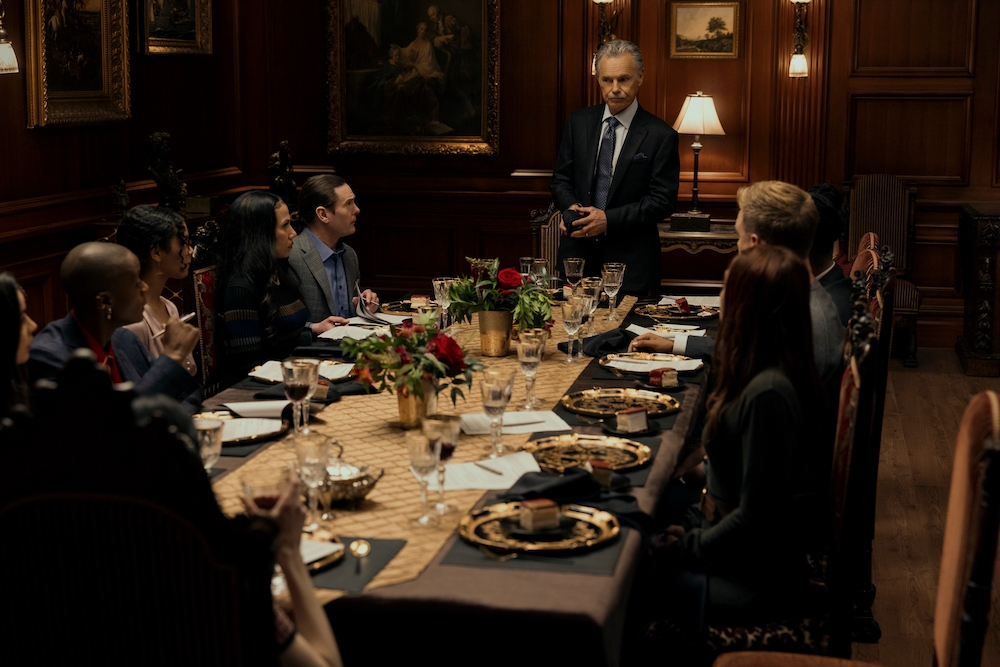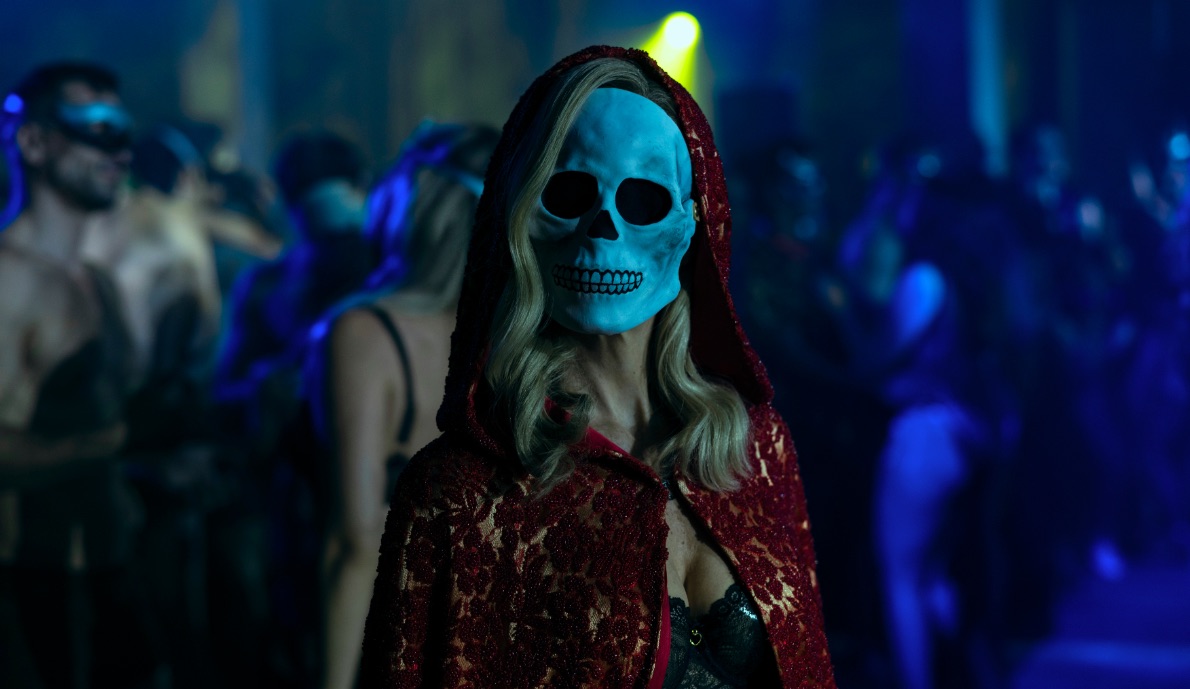Mike Flanagan’s ‘The Fall of the House of Usher’ follows the story of Roderick Usher, his family, and his pharmaceutical empire, all of which comes crashing down on him when his past catches up. Much like his previous works, Flanagan brings together various characters with complicated relationships, thrown together in a series of tragedies that rob them of everything they have. This is Flanagan’s ode to Edgar Allan Poe, whose works inspired the show. While the show’s creator used ‘The Fall of the House of Usher’ as the opening point of the story, he has drawn upon a lot of other Poe’s works, stringing everything together seamlessly.
Apart from his poems and short stories, Flanagan also brought in some people from Poe’s real life and placed them in similar positions they held in the author-poet’s life. For example, Roderick and Madeline’s mother is named Eliza, after Poe’s mother, and their enemy, Rufus Griswold, is named after one of the people Poe despised, along with William Longfellow. The show also references his famous daguerreotype, Ultima Thule. The true essence of the show, however, lies in the short stories that Poe wrote over the years. Here are the ones that made it into the show. SPOILERS AHEAD
The Plot of the Netflix Series is a Mix of Several Short Stories by Poe

One of the clever things Flanagan does with ‘House of Usher’ is to reference the short stories in the titles of the episodes. The show is based on ‘The Fall of the House of Usher,’ but the short story barely has three characters and insufficient material to be adapted into an eight-episode series. So, Flanagan linked it to other Poe stories.
The Masque of the Red Death
The second episode’s title, ‘The Masque of the Red Death,’ follows the story of Prince Prospero, who hides in his palace, throwing a masquerade ball while the people of his country die of a terrible plague. However, death finds its way into the ball and kills everyone. This is similar to what happens to the Prince of the Usher family, Prospero, aka Perry. He throws a masquerade, believing that it would be his crowning achievement. Instead, Death walks in and claims his life, along with everyone else in the room.
The Murders in the Rue Morgue

The third episode references another short story, which features characters like Auguste Dupin and Camille L’Espanaye. In Poe’s story, Dupin is a pre-Sherlock detective who uses his incredible powers of deduction to solve the double murder of Camille L’Espanaye and her mother. Strangely, an orangutan is involved. The show also references Rue Morgue when Camille reveals that that’s what they used to call the lab before Vic took over.
The Black Cat and The Spectacles
The fourth episode of the series, focusing on the end of Leo Usher’s life, draws inspiration from two stories. ‘The Black Cat’ is told from the perspective of the murderer, and the show references it clearly as a black cat becomes the cause of Leo’s death. The name of the character comes from another short story, ‘The Spectacles,’ in which the protagonist refuses to wear spectacles and has to pay a price because of that. In the show, Leo refuses to stop using drugs, which becomes one of the reasons why things turn out for him the way they do.
The Tell-Tale Heart and The Premature Burial

The fifth episode of the show focuses on the death of Victorine LaFourcade. The name of the character comes from Poe’s short story, ‘The Premature Burial,’ but the plot comes from ‘The Tell-Tale Heart.’ As Vic becomes obsessed with making the heart machine work, she ends up murdering someone close to her. Throughout the episode, she is haunted by a ticking noise that seems to follow her everywhere until she eventually has to face the consequences of her actions.
The Goldbug and William Wilson
The sixth episode in the series focuses on the fall of Tamerlane Usher. Her husband’s name, Bill Wilson, comes from Poe’s short story, ‘William Wilson.’ The episode mixes the themes of ‘The Goldbug’ and ‘William Wilson’ and focuses on Tamerlane’s downfall as she loses her mind after not having slept for days. She starts to hallucinate and sees Verna taking her place everywhere, acting as her double.
The Pit and the Pendulum and Metzengerstein
The seventh episode of the series focuses on the death of Frederick Usher. The name comes from Poe’s short story ‘Metzengerstein,’ which follows a man named Frederick, the last remaining member of his family, like Freddy, the last remaining Usher who is bound to inherit everything now that his siblings are dead. The episode combines the plot with ‘The Pit and the Pendulum,’ which factors into the scene where Freddy is killed.
The Narrative of Arthur Gordon Pym of Nantucket and Other Stories

One of the main characters in the show is Arthur Pym, the lawyer and fixer of the Usher family, who always gets them out of a bad situation. While Pym doesn’t receive much focus in the show, we do find out about the expedition he was part of at the age of 25, where he saw some truly terrible things. Pym’s character and his background are pulled from Poe’s novel, ‘The Narrative of Arthur Gordon Pym of Nantucket.’
Apart from this, ‘The Cask of Amontillado’ is another story that has a huge influence on the show’s plot. This is where the company, Fortunato, gets its name from. The plot of the story also factors into the fate of Rufus Griswold, so any discussions about it would be huge spoilers. The show also references some minor stories, mainly depending on them for some lines in a monologue or for naming the characters. ‘Eleonora,’ ‘Morella,’ and ‘The Journal of Julius Rodman’ are among them.
The Fall of the House of Usher Quotes Several Edgar Allan Poe Poems

The most notable of all of Poe’s works is his poem, ‘The Raven.’ The Netflix series uses it as one of the cornerstones of the show and makes several references to it throughout the series. The name of Carla Gugino’s character, Verna, is an anagram for “raven,” which is also her shapeshifting form. The poem also lends the name Lenore to Roderick Usher’s granddaughter, for whom he later quotes a few lines from the poem. It is Lenore’s death that completely breaks Roderick, which is also the state of mind of the protagonist in the poem. The word “Nevermore” also becomes an important part of the puzzle, with the first and final episode of the show, ‘The Midnight Dreary’ and ‘The Raven,’ also getting their titles from it.
Another of Poe’s poems to feature repeatedly in the show is ‘Annabel Lee.’ This is the name of Roderick Usher’s first wife, to whom he recites several lines from the poem. We also hear a section of ‘The City in the Sea’ and ‘Spirits of the Dead’ in at least two scenes. Another poem to find a reference in the show is ‘Tamerlane,’ which lends its name to Roderick Usher’s second child.
Read More: The Fall of the House of Usher Timeline, Explained


